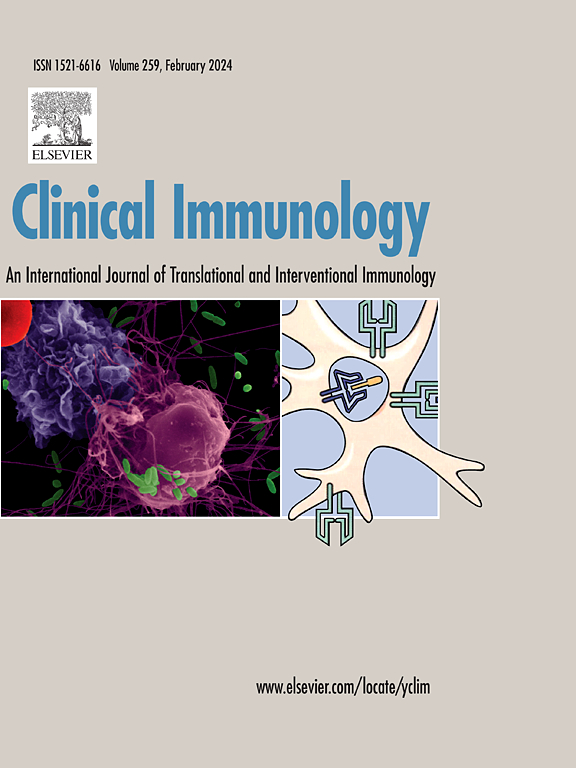在系统性红斑狼疮中,活化的CD4+ T细胞通过CD40/CD40L信号传导和直接接触上调B细胞的PD-L1表达
IF 3.8
3区 医学
Q2 IMMUNOLOGY
引用次数: 0
摘要
程序性细胞死亡蛋白1 (PD-1)在T细胞上的表达与自身免疫性疾病的发病机制有关;然而,程序性死亡配体1 (PD-L1)在B细胞上表达的功能作用仍然没有得到充分的表征,特别是在系统性红斑狼疮(SLE)中CD4+ T细胞介导的调节的背景下。流式细胞术分析显示,PD-L1+ B细胞表面共刺激分子CD80和CD86表达上调,同时抗原呈递分子人白细胞抗原DR (HLA-DR)表达下调。此外,在SLE患者的外周血中观察到PD-L1+ B细胞类别转换频率升高。通过共培养系统和transwell实验,我们证明CD4+ T细胞通过直接的细胞间相互作用调节B细胞上PD-L1的表达。在机制上,这种调节被证明依赖于双向CD40/CD40L信号传导。这些发现促进了我们对SLE发病机制中PD-L1介导的免疫调节的理解,并确定了PD-L1+ B细胞作为治疗干预的潜在靶点。本文章由计算机程序翻译,如有差异,请以英文原文为准。
Activated CD4+ T cells upregulate PD-L1 expression on B cells through CD40/CD40L signaling and direct contact in systemic lupus erythematosus
Programmed cell death protein 1 (PD-1) expression on T cells has been implicated in the pathogenesis of autoimmune diseases; however, the functional role of programmed death-ligand 1 (PD-L1) expression on B cells remains insufficiently characterized, particularly in the context of CD4+ T cell–mediated regulation in systemic lupus erythematosus (SLE). Flow cytometric analysis revealed that PD-L1+ B cells exhibited upregulated surface expression of the co-stimulatory molecules CD80 and CD86, alongside a concomitant downregulation in the expression of the antigen-presenting molecule human leukocyte antigen DR (HLA-DR). Furthermore, an elevated frequency of class-switched PD-L1+ B cells was observed in the peripheral blood of patients with SLE. Using co-culture systems and transwell assays, we demonstrated that CD4+ T cells modulate PD-L1 expression on B cells via direct cell–cell interactions. Mechanistically, this regulation was shown to be dependent on bidirectional CD40/CD40L signaling. These findings advance our understanding of PD-L1-mediated immunoregulation in SLE pathogenesis and identify PD-L1+ B cells as potential targets for therapeutic intervention.
求助全文
通过发布文献求助,成功后即可免费获取论文全文。
去求助
来源期刊

Clinical immunology
医学-免疫学
CiteScore
12.30
自引率
1.20%
发文量
212
审稿时长
34 days
期刊介绍:
Clinical Immunology publishes original research delving into the molecular and cellular foundations of immunological diseases. Additionally, the journal includes reviews covering timely subjects in basic immunology, along with case reports and letters to the editor.
 求助内容:
求助内容: 应助结果提醒方式:
应助结果提醒方式:


